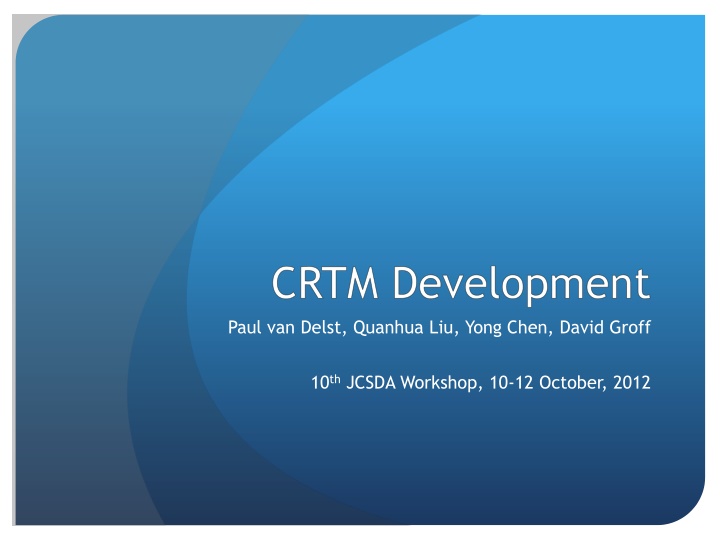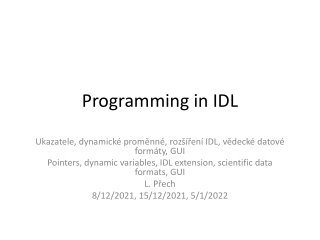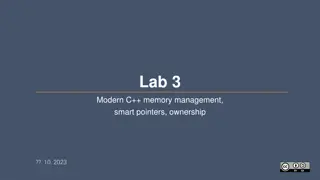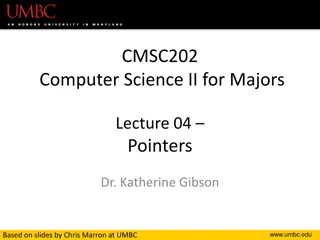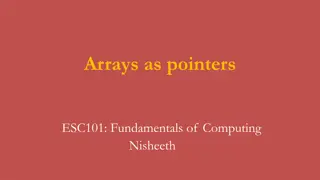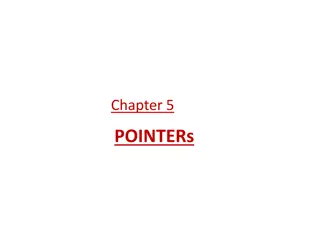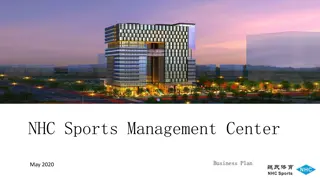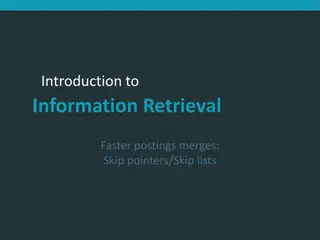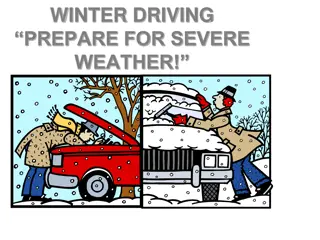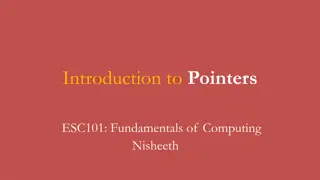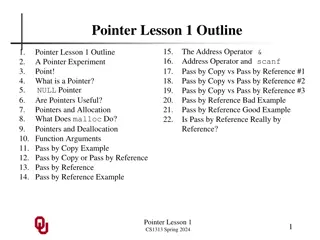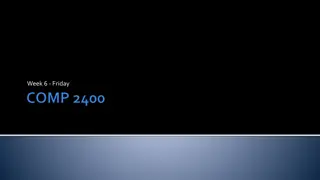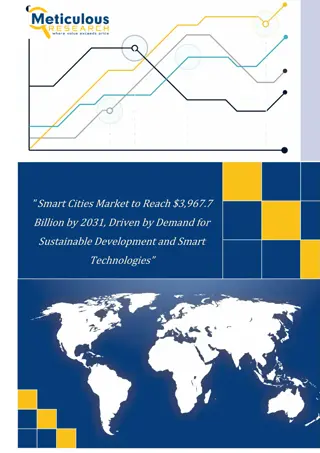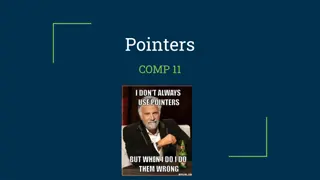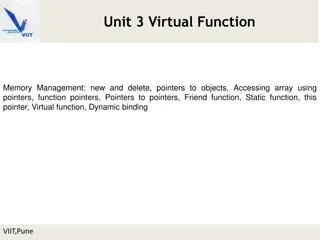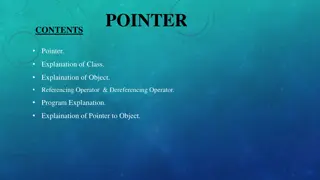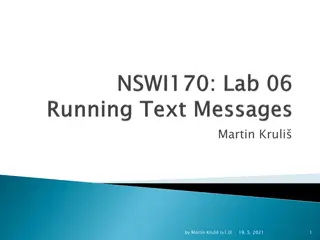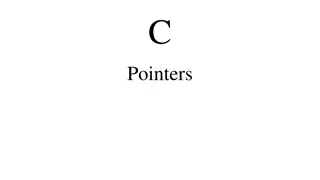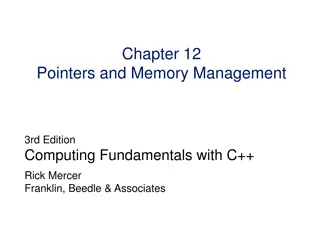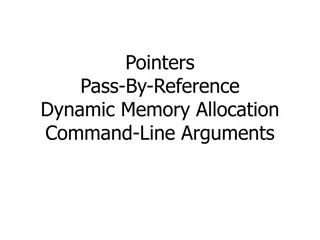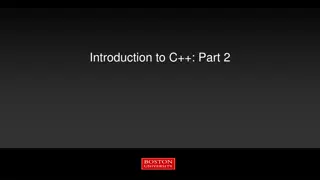C++ Smart Pointers Overview for Winter 2023 Course
The importance of smart pointers in C++ programming and how they enhance memory management. Discover the benefits of using std
Download Presentation

Please find below an Image/Link to download the presentation.
The content on the website is provided AS IS for your information and personal use only. It may not be sold, licensed, or shared on other websites without obtaining consent from the author.If you encounter any issues during the download, it is possible that the publisher has removed the file from their server.
You are allowed to download the files provided on this website for personal or commercial use, subject to the condition that they are used lawfully. All files are the property of their respective owners.
The content on the website is provided AS IS for your information and personal use only. It may not be sold, licensed, or shared on other websites without obtaining consent from the author.
E N D
Presentation Transcript
CRTM Development Paul van Delst, Quanhua Liu, Yong Chen, David Groff 10thJCSDA Workshop, 10-12 October, 2012
Outline CRTM v2.1 Release CRTM v2.2 Release plans CRTM v3.0 Release plans JCSDA Workshop, 10-12 October, 2012 1
CRTM v2.1 Release (finally!) JCSDA Workshop, 10-12 October, 2012 2
Acknowledgements Thanks are due to a great many people for help with v2.1 development. Todd Schaack, Brad Pierce, Jim Davies, Tom Greenwald, Eva Borbas, and Chris Moeller at CIMSS/SSEC/UW-Madison Louis Grasso and Yoo-Jeong Noh at CIRA/CSU-Fort Collins Tomoko Koyama abd Dan Birkenheuer at NOAA/ESRL Xingming Liang and Alex Ignatov fo the MICROS team at NESDIS/STAR Andrew Collard, John Derber, and the entire GSI team at NCEP/EMC There are also many others that are not mentioned here. JCSDA Workshop, 10-12 October, 2012 3
CRTM v2.1 Release; Whats New New science Updated microwave sea surface emissivity model Updated microwave land surface emissivity model Non-LTE for hyperspectral infrared sensors Successive order of interaction radiative transfer algorithm New functionality Aerosol optical depth functions Channel subsetting Number-of-streams option Scattering switch option Aircraft instrument capability Options structure I/O Interface changes Surface type specification changes Emissivity model initialisation file changes Other Code refactoring and computational speedup. JCSDA Workshop, 10-12 October, 2012 4
Updated microwave sea surface emissivity model: FASTEM5 Initial implementation of FASTEM4 (May 2011, initial v2.1 release candidate) showed an anomalous wind speed dependence. Tracked to missing small-scale correction, foam coverage. Correction of these, as well as re-fitting the polynomials for the large-scale correction, gave us FASTEM5. Offline results are equivocal; good for lower frequency surface channels, not as much for higher frequency channels. JCSDA Workshop, 10-12 October, 2012 5
AMSU-A Ch1, FASTEM5/4/1 JCSDA Workshop, 10-12 October, 2012 6
AMSU-A Ch2, FASTEM5/4/1 JCSDA Workshop, 10-12 October, 2012 7
AMSU-A Ch3, FASTEM5/4/1 JCSDA Workshop, 10-12 October, 2012 8
AMSU-A Ch15, FASTEM5/4/1 JCSDA Workshop, 10-12 October, 2012 9
Updated microwave land surface emissivity model (W. Zheng) The model now uses more information about the surface characteristics. Soil and vegetation types (those defined in the GFS), and leaf area index (LAI) are now used. Impacts of update are smaller biases, RMSEs, and more assimilated observations. JCSDA Workshop, 10-12 October, 2012 10
AMSU-A Ch1, Impact of MWLSEM Experiment Control JCSDA Workshop, 10-12 October, 2012 11
AMSU-A Ch2, Impact of MWLSEM Experiment Control JCSDA Workshop, 10-12 October, 2012 12
AMSU-A Ch3, Impact of MWLSEM Experiment Control JCSDA Workshop, 10-12 October, 2012 13
AMSU-A Ch4, Impact of MWLSEM Experiment Control JCSDA Workshop, 10-12 October, 2012 14
Non-LTE (Y. Han) Implementation in May 2011 (initial v2.1 release candidate). Only implemented for hyperspectral infrared sensors; IASI, CrIS, and AIRS. Correction of these, as well as re-fitting the polynomials for the large-scale correction, gave us FASTEM5. Offline results are equivocal; good for lower frequency surface channels, not as much for higher frequency channels. JCSDA Workshop, 10-12 October, 2012 15
Impact of NLTE in IASI spectra See Yong Chen s poster for details. JCSDA Workshop, 10-12 October, 2012 16
Implementation of SOI algorithm Involved refactoring of the CRTM RTSolution modules. We now have specific SOI, and ADA, RTSolution modules. Initial characterisation indicates for less scattering, SOI results agree with, and computational speeds are comparable to, ADA. For optically thicker clouds/aerosols, ADA is still faster. Characterisation is continuing. JCSDA Workshop, 10-12 October, 2012 17
CRTM v2.2 Release Plans JCSDA Workshop, 10-12 October, 2012 18
Planned v2.2 updates Single/double precision compilation switch Modification to TauCoeff type definitions so that I/O is precision-switch independent Scattering indicator (T. Greenwald, CIMSS/SSEC/UW-Madison) 32-stream cloud/aerosol LUT capability AOD modules for CMAQ 4.7.1 aerosols. ATMS snow/ice emissivity model (M. Chen, JCSDA) Cloud fraction capability (M-J. Kim, CIRA/JCSDA) TauProd processing update Land surface emissivity database interface JCSDA Workshop, 10-12 October, 2012 19
CRTM v3.0 Release Plans JCSDA Workshop, 10-12 October, 2012 20
Planned v3.0 updates Implementation of threading in CRTM. Preliminary proof-of-concept implemented. Specification of fractional coverage of subtypes in the input Surface structure. Interface change. Specification of soil temperature and moisture profiles in Surface structure. Interface change. Update fundamental physical constants in LBL and CRTM modules to the 2010 CODATA recommended values. Impacts all SpcCoeff data, as well as TauCoeff generation. JCSDA Workshop, 10-12 October, 2012 21
Questions? JCSDA Workshop, 10-12 October, 2012 22
